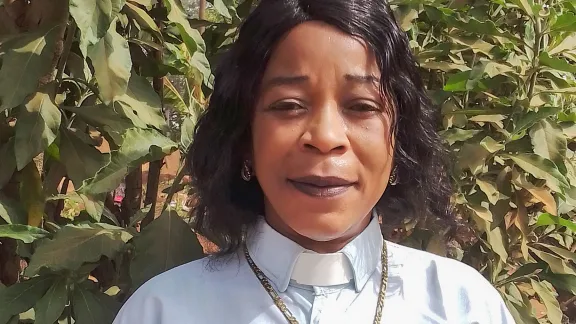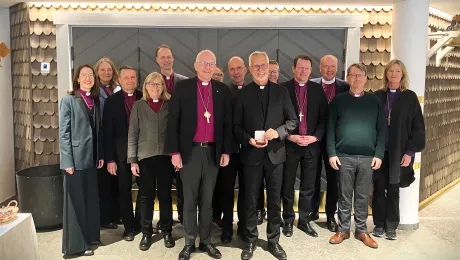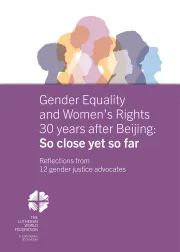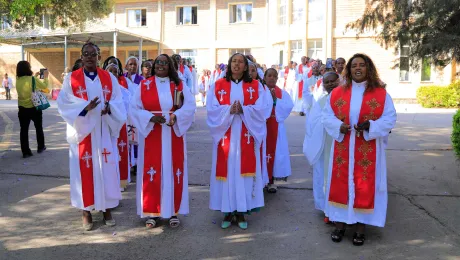
Cameroonian theologian Rev. Tientcheu Djomgoue Marie Besong, a scholarship holder of LWFâs Hélène Ralivao Fund. Photo: Private
Cameroonian pastor reflects on potential of LWF scholarship fund for the church in Africa
It is a great honor to have been among the first scholarship recipients of the Hélène Ralivao Fund. I am privileged to have known the Malagasy Lutheran Church theologian, Mama Hélène, as we affectionately called her. The last time we met was in 2018, during a seminar in Ethiopia, discussing how churches and religious institutions in Africa address sexual and gender-based violence.
I am grateful that The Lutheran World Federation named this fund after her, to honor a person who was truly committed to fighting violence against women.
I was among the second batch of women to be ordained in the Evangelical Lutheran Church in Cameroon (EELC) in 2013. Since then, I have held different positions in the church: a development worker, coordinator of hospital chaplaincies, a pastor in both rural and urban congregations, executive secretary in the EELC national office, and my current post, as secretary to the director of the Protestant Hospital in Ngaoundéré.
In September, I will start my four-year doctoral studies in pastoral care and psychotherapy at the Martin Luther University College (associated with the Evangelical Lutheran Church in Canada) under the Wilfrid Laurier University in Waterloo, Ontario. The PhD program is directly related to many things I have encountered as a pastor and to some very painful experiences that women go through, virtue of their gender and cultural dynamics. My Bachelor’s and Master’s studies in the Theological College of Northern Nigeria, affiliated to the University of Jos, and the School of Mission and Theology in Stavanger-Norway respectively, offer a solid basis as they are all related to human relationships.
Trauma and stigma
As coordinator of hospital chaplaincies, I worked with women suffering from obstetric fistula, a childbirth injury that leads to incontinence and other challenges. Surgery is the only treatment to resolve this damage. The medical condition aside, our society does not embrace such women. They are despised, stigmatized and looked upon as witches even by their spouses. Even after their physical healing, they carry trauma and frustration throughout their lives because of the rejection they have gone through. Such patients are in great need of pastoral care and psychotherapy in order to be physically and mentally healed. Unfortunately, we run short of both: either because we neglect our duty, but mostly due to the lack of well-trained personnel in that domain.
There are also people who live in the midst of crises in our local church settings, community and society, and they are often left to deal with the associated fear and trauma. Others are sick because of the mental and psychological weight of their daily life struggles, and may not need any tablet or drip to get well. It is at this level that psychotherapy comes in.
While the church takes an active stance in preaching the Gospel of Jesus Christ, and serving the neighbor, it also needs well trained personnel to support parishioners who are weighed down by their daily problems.
While the church takes an active stance in preaching the Gospel of Jesus Christ, and serving the neighbor through acts of diakonia including peace and reconciliation, it also needs well trained personnel to support parishioners who are weighed down by their daily problems. In this regard, it is encouraging to see that many societies are beginning to acknowledge mental illness for what it is.
A better pastor, lecturer and hospital chaplain
Out of the 12 ordained pastors in the EELC who hold a PhD, only one is a woman. I therefore look forward to increasing that number with my studies. It is my hope that I can support my church and other faith communities to address the needs of many people who have been robbed of their self-esteem by the crises and tragedies of life.
The Hélène Ralivao Fund goes a long way in making me a better pastor, lecturer, hospital chaplain and a future role to be defined after my studies. In addition to empowering individual women as theologians and leaders, the fund has the potential to increase skills that lead toward more inclusive, safe, and just communities of women and men.
The author Rev. Tientcheu Djomgoue Marie Besong, is an ordained pastor of the Evangelical Lutheran Church in Cameroon (EELC). The former congregation pastor, coordinator of hospital chaplaincies and development worker is currently secretary to the director of the EELC-run Protestant Hospital in the northern city of Ngaoundéré. The EELC has 350,000 members and it joined the LWF in 1971.


